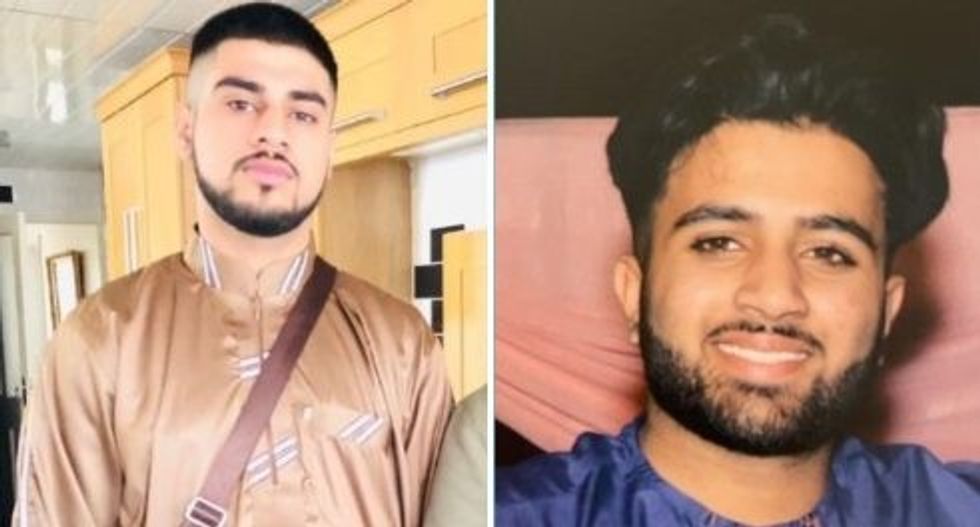A social media influencer and her mother were sentenced to jail last Friday (1), after being convicted of the "callous and cold-blooded" murder of two men, whose car was forced off a dual carriageway in a high-speed chase and caught fire.
Leicester crown court judge Timothy Spencer KC sentenced Mahek Bukhari, 24, to more than 31 years and her 46-year-old mother, Ansreen Bukhari, to 26 years in prison.
Saqib Hussain and Mohammed Hashim Ijazuddin, both 21, died instantly after their vehicle was forcibly driven off the A46 near Six Hills, Leicestershire, in the early hours of February 11 last year. The collision led to the car striking a central reservation barrier and a tree, Leicestershire Police said.

Last month, after a 15-week trial, Ansreen, Mahek, Raees Jamal and Rekan Karwan were convicted of the murders of Hussain and Ijazuddin.
Sanaf Gulamustafa, Ameer Jamal, and Natasha Akhtar were acquitted of murder charges, but were found guilty of the manslaughter of Hussain and Ijazuddin.
The judge said Instagram and TikTok played a central role in the "cold-blooded" plot of Mahek, a social media influencer and her mother, Ansreen, from Stoke-on-Trent, Staffordshire, to kill the two men, in an attempt to prevent the release of a sex tape.
Hussain and Ansreen, who was married, had an affair for around three years, but when she tried to end the relationship, Hussain threatened to reveal the relationship to her husband and to share sexual images and videos of her.
Ansreen offered to pay back money which Hussain had spent during their relationship. She and her daughter (who was aware of her mother’s relationship) asked Hussain to meet in a Tesco car park in Hamilton, Leicester.
However, the mother and daughter planned to ambush Hussain, the police said. Six other defendants, along with Mahek and Ansreen ambushed Hussain and Ijazuddin in two vehicles – an Audi TT and a Seat Leon.
CCTV footage showed the cars in a chase before a 999 call was made by a panicked Hussain, who feared for his life.
The impact of the collision was found to have caused the Skoda car in which Hussain and Ijazuddin were travelling, to split into two and the engine of the car to detach from the body. Both victims died immediately from multiple injuries, prior to the fire taking hold, the police said.
The judge condemned Mahek's pursuit of "tawdry fame" as an influencer and criticised Ansreen's "calamitous decision" to entrust matters to her daughter, the BBC reported.
The judge was quoted as saying, “TikTok and Instagram are at the heart of this case, Mahek Bukhari being a social media influencer.
“That is the reason you, Mahek, dropped out of university. Had you not done so, you would now be a young graduate with your whole life ahead of you. Now, you constrain yourself to prison for all of your best years.”
The judge said, "The prosecution categorised this as a story of love, obsession, and extortion and they are right.”
Mahek, a rising TikTok star, had her mother's support in her influencer endeavors. She had abandoned her university education to pursue a career in social media, which was beginning to yield results.
With almost 129,000 followers and income generated through brand endorsements, she enjoyed an active schedule filled with parties and product launch events across the country.
Mahek frequently highlighted her "elite relationship" with her mother, Ansreen, who often appeared in her videos.
Detective inspector Mark Parish of Leicestershire Police said Ansreen felt "flattered" by Hussain’s interest in her. Their meetings took place at various locations, including hotels, restaurants, and shisha lounges.
The judge noted that Hussain had been engaging in blackmail and that he was volatile.
However, he expressed his belief that a “more mature approach” to ending the affair could have led to a resolution.
He said Ijazuddin had no culpability in the situation, highlighting that his involvement was solely related to offering a ride to a friend, and he had become unintentionally entangled in the deadly circumstances.
Parish said: “This was a callous and cold-blooded attack which ultimately cost two men their lives.
“After setting Mr Hussain and Mr Ijazuddin up, chasing them at high speed and then ultimately ramming their car off the road, none of the defendants made any attempt to help the victims or to call for help. Instead they drove on and then even drove back past the collision site. Still no-one attempted to offer any help.
“As the defendants found guilty were arrested, charged and stood trial before a court, lies were continually told in order to try and cover their tracks. Their only concern during the whole incident and investigation has been for themselves.
In a statement conveyed on behalf of Hussain's family, it was revealed his parents had been reduced to "two lifeless corpses," unable to even eat or drink in the days leading up to their son's funeral.
They said, “Saqib was a much-loved young man. He was kind, compassionate, caring and sensible. We are still struggling to come to terms with the enormity of our loss. Saqib’s death has brought so much sadness, not just to his family, but to the many people that knew him.”
Ijazuddn’s family said, "The day we found out Hashim had died, our world came crashing down. His death has changed everything.
"Everyone who knew Hashim, loved him. His death is not just a massive loss to our family but also to our whole community.
"Hashim was a cheeky young man who was always smiling, a handsome man who was beautiful both on the inside and out. He would do anything for anyone, was very caring and had a very kind heart.
"Hashim would always put others first and wouldn’t hesitate to help others if they needed it. On that tragic day, he was simply helping his friend and this resulted in his death.
"It has been extremely painful not only losing Hashim at such a young age but also in the circumstances in which we lost him.”




